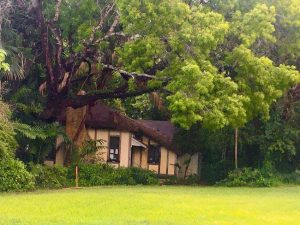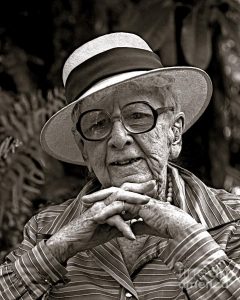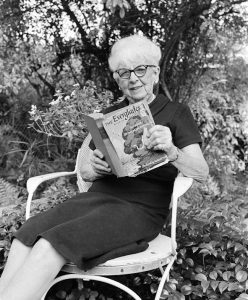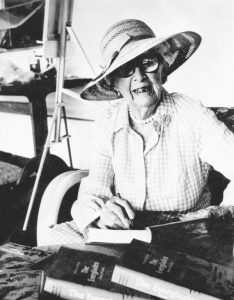‘Marjory’ tells the story of the epic life of conservationist Marjory Stoneman Douglas
 Each year the Fort Myers Film Festival screens a host of environmental features, documentaries and short films. Included in this year’s offerings is Kaman Sway’s Marjory. Through the film, Sway tells the story of the epic life of American journalist, author, women’s suffrage advocate and conservationist Marjory Stoneman Douglas.
Each year the Fort Myers Film Festival screens a host of environmental features, documentaries and short films. Included in this year’s offerings is Kaman Sway’s Marjory. Through the film, Sway tells the story of the epic life of American journalist, author, women’s suffrage advocate and conservationist Marjory Stoneman Douglas.
Today, Marjory Stoneman Douglas’ name is regrettably associated with the mass shooting at the high school in Parkland, Florida that bears her name. But that was not always the case. For nearly three-quarters of a century, Stoneman Douglas was affectionately known as the Mother of the Everglades and her name stood for conservation and protection of the Sea of Grasses.
Marjory came  to Miami in 1915 to work with her father, who was then the editor of The Miami Herald. While serving as the paper’s assistant editor, she periodically wrote editorials urging protection of Florida’s unique ecology. But it wasn’t until well after she’d departed the Herald that she took the lead in fighting for the Florida Everglades. In the same year that Everglades National Park was established (1947), she published The Everglades:
to Miami in 1915 to work with her father, who was then the editor of The Miami Herald. While serving as the paper’s assistant editor, she periodically wrote editorials urging protection of Florida’s unique ecology. But it wasn’t until well after she’d departed the Herald that she took the lead in fighting for the Florida Everglades. In the same year that Everglades National Park was established (1947), she published The Everglades:  River of Grass describing one of the most beautiful, extraordinary and fragile ecosystems on the entire planet.
River of Grass describing one of the most beautiful, extraordinary and fragile ecosystems on the entire planet.
From that point until her death at the age of 108, Marjory fought to protect the River of Grass from a host of threats ranging from efforts to drain it to the U.S. Army Corps of Engineers’ use of a complex of dams, dikes, levees, pump stations and canals disrupted the natural flow of water through the Everglades and into the estuaries that depend on the “river’s” flow for proper salinity and pressure in order to advance the interests of agriculture, sugar cane and development in and around the ‘Glades.
 In 1969, Stoneman Douglas formed the Friends of the Everglades to stop the construction of a jetport in the area of the present-day Big Cypress National Preserve. Under her direction and with her support, the organization grew to more than 6,000 members by the year 2000, and today it still exerts a huge influence in all environmental issues affecting the Everglades.
In 1969, Stoneman Douglas formed the Friends of the Everglades to stop the construction of a jetport in the area of the present-day Big Cypress National Preserve. Under her direction and with her support, the organization grew to more than 6,000 members by the year 2000, and today it still exerts a huge influence in all environmental issues affecting the Everglades.
On the occasion of her 100th birthday, Marjory was asked if she had hope for the survival of the Everglades. “I am neither an optimist nor a pessimist,” she answered curtly. “I say it’s got to be done.”
 Three years later (in 1993), Marjory Stoneman Douglas was awarded the Medal of Freedom by President Bill Clinton. After the Mother of the Everglades passed in her Coconut Grove home in May of 1998, her ashes were, fittingly, spread in Everglades National Park – her River of Grass.
Three years later (in 1993), Marjory Stoneman Douglas was awarded the Medal of Freedom by President Bill Clinton. After the Mother of the Everglades passed in her Coconut Grove home in May of 1998, her ashes were, fittingly, spread in Everglades National Park – her River of Grass.
It is this story that Marjory will recount during this year’s Fort Myers Film Festival. It screens in the Sidney & Berne Davis Art Center during Environmental Block 2 at 3:00 p.m. on Friday, May 14 along with Barbara Crites: Snorkeling St. John, Stay Wild, A Fisher’s Right to Know and Soiled.
April 24, 2021.














 Tom Hall is both an amateur artist and aspiring novelist who writes art quest thrillers. He is in the final stages of completing his debut novel titled "Art Detective," a story that fictionalizes the discovery of the fabled billion-dollar Impressionist collection of Parisian art dealer Josse Bernheim-Jeune, thought by many to have perished during World War II when the collection's hiding place, Castle de Rastignac in southern France, was destroyed by the Wehrmacht in reprisal for attacks made by members of the Resistance operating in the area. A former tax attorney, Tom holds a bachelor's degree as well as both a juris doctorate and masters of laws in taxation from the University of Florida. Tom lives in Estero, Florida with his fiancee, Connie, and their four cats.
Tom Hall is both an amateur artist and aspiring novelist who writes art quest thrillers. He is in the final stages of completing his debut novel titled "Art Detective," a story that fictionalizes the discovery of the fabled billion-dollar Impressionist collection of Parisian art dealer Josse Bernheim-Jeune, thought by many to have perished during World War II when the collection's hiding place, Castle de Rastignac in southern France, was destroyed by the Wehrmacht in reprisal for attacks made by members of the Resistance operating in the area. A former tax attorney, Tom holds a bachelor's degree as well as both a juris doctorate and masters of laws in taxation from the University of Florida. Tom lives in Estero, Florida with his fiancee, Connie, and their four cats.